
- 10 -
PAINT SPRAYING HINTS
WARNING
NEVER attempt to spray unless you are wearing suitable, approved
respiratory and eye protection.
REMEMBER that some modern paints require specialist respiratory
protection...always consult the paint manufacturers instructions.
1. GENERAL PREPARATION
a. Ensure that the area in which you will be spraying is clean and dust free.
b. Connect spray gun to compressor via suitable flexible hose.
c. With no paint in spray gun, test system for air leaks.
d. Cover adjacent pieces of equipment to prevent overspray. Mask areas
of the article not to be sprayed.
e. Ensure surface to be painted is clean, dry and free from oil and dust.
Check paint manufacturer’s instructions for any special surface
preparation required.
REMEMBER - TIME SPENT PREPARING SAVES TIME SPENT FINISHING
2. PAINT PREPARATION
a. Achieve the correct paint viscosity. This should be done according to
paint manufacturer’s instructions, and will vary according to type of paint.
b. Having mixed the paint thoroughly in a separate container, pour into the
spray gun paint container through a fine filter.
DO NOT OVERFILL SPRAY GUN PAINT CONTAINER - three quarters full is maximum
c. It is usually best to experiment with a couple of practice spray coats on a
piece of material with the same type of surface as the article you wish to
spray, eg. metal for a car body panel, wood for a piece of furniture etc.
d. Some common problems:
PROBLEM CAUSE CORRECTION
Paint does not atomise Paint is too thick, air Add thinners. Increase air press.
(comes out in blobs) pressure is too low. (not above 50 psi, unless
specified by paint manuf.
Paint dries before hitting Paint is too thin. Air Add more paint.
surface, leaving it dry pressure is too high Reduce air pressure
with a rough texture
Finish is pitted like Air pressure too high Reduce air pressure,
Orange peel or spray too close to increase distance between
work gun and work.
- 7 -
1. Ensure that the ON/OFF switch is in the off ‘O’ position.
NEVER USE THE MAINS SWITCH TO STOP THE MOTOR.
2. Depress equipment trigger (spraygun) to release air from the
hose and compressor before disconnecting from the machine.
3. Switch off and disconnect from the mains supply.
SHUTTING DOWN THE COMPRESSOR
Set the regulator to the desired operating pressure and then switch the machine
ON at the rocker switch. The Monza should start immediately.
However, if at any time it hesitates to do this, then immediately trigger the spraygun
or tool in order to release any built up pressure.
The air pressure may, within limitations, be increased by turning the control knob
clockwise or decreased by turning it anticlockwise.
You may need to experiment to find the setting best suited for a particular job.
When spraying paint, or similar material, it is usually best to operate at the lowest
pressure which gives a satisfactory finish.
The syphon spraygun supplied with your Monza Air Compressor is most versatile
and can be used to apply a variety of paint material. It features two basic controls:
1. Paint control knob at the rear of the spraygun which adjusts the position of
the main needle and consequently the volume of paint which can be sprayed.
Minimum paint flow is achieved by having this control screwed in (clockwise)
and vice versa.
2. A fan spray control located just to the side of the spray head will alter the
shape of the fan spray.
Refer to the spraygun manual for full details.




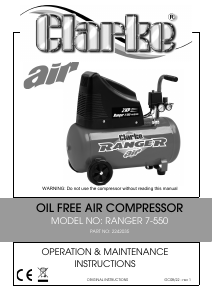
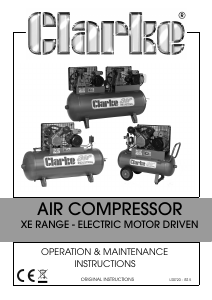


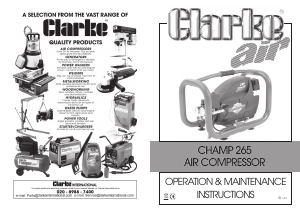
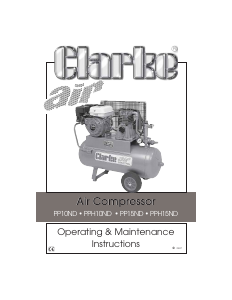
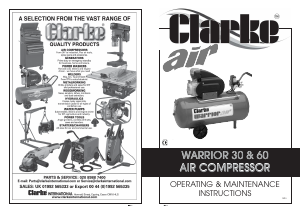
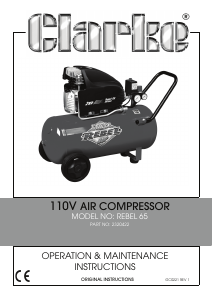
Praat mee over dit product
Laat hier weten wat jij vindt van de Clarke Monza Compressor. Als je een vraag hebt, lees dan eerst zorgvuldig de handleiding door. Een handleiding aanvragen kan via ons contactformulier.